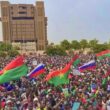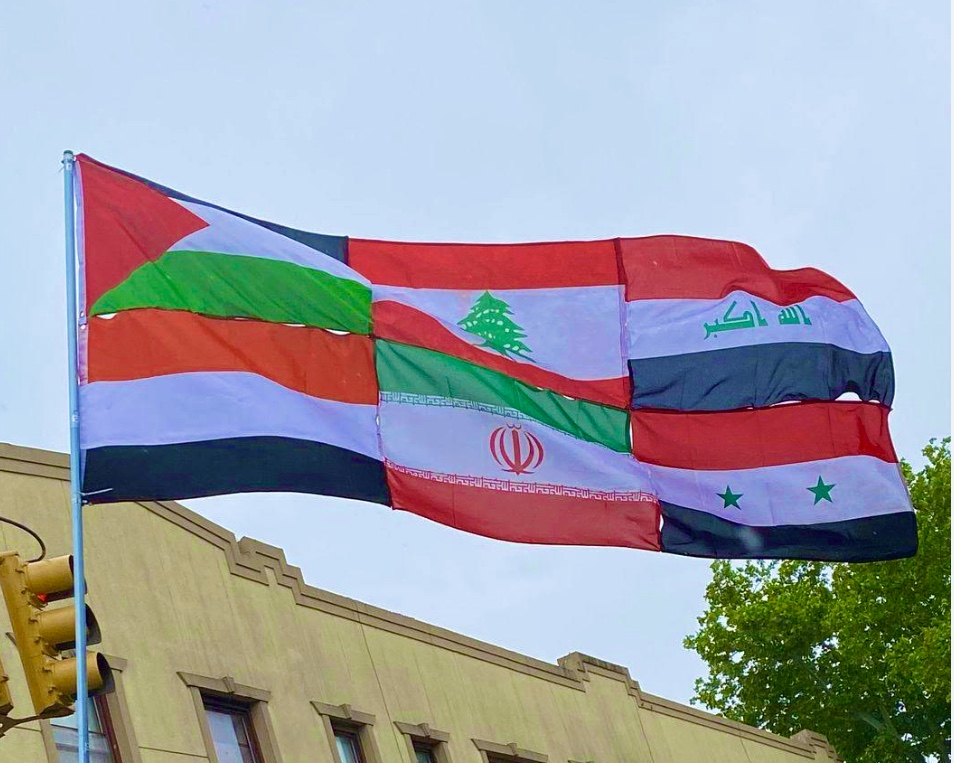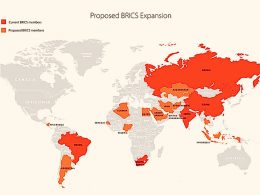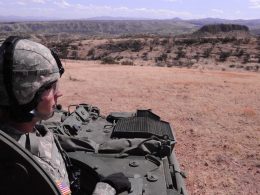To sell this latest colonial war, monopoly capital has concocted the lie that Syria’s anti-imperial government was nothing but an anti-democratic menace. NATO’s narrative agents have been tasked with painting Assad as another Hosni Mubarak, making Syria’s “revolution” fit within the romantic narrative of a people rising up and taking control. This narrative couldn’t win over the vast majority of Syria’s masses, which is why Assad’s overthrow could only be carried out by a tiny minority. And because the masses weren’t behind this counter-revolution, there’s a popular base for the project to rebuild the resistance; to defeat the empire and its proxies, however strong they may look right now on the surface.
Anti-imperial Syria’s democratic character
The elements of Assad’s critics who had truly valid grievances, and who tried to enact positive changes, have ironically been sidelined by those who promote the “dictatorship” narrative. The “revolutionaries” have set Syria backwards in all respects, bringing about the victory of brutal theocrats and foreign invaders. The anti-imperialists who have factually based problems with Assad’s policies are not the ones responsible for the government’s overthrow, and anyone who’s consistently anti-imperialist wouldn’t support overthrowing Assad anyhow.
This view isn’t controversial within the ideological circles which I’m typically most likely to reach. But it’s necessary for us within the anti-imperialist space to study exactly why anti-imperial Syria wasn’t a dictatorship, because in order to help change the future, we must not let imperialism control the past. When you honestly look at the history, it’s clear that the perception of Assad as a despot was not the reality; and that therefore all the ostensibly pro-Palestine leftists who supported Assad’s downfall did so for nothing. The only effect their actions had was to enable a massive expansion of Zionism’s genocidal campaign, and assist imperialism’s broader terror forces. This must be how the world remembers these events: as a story of betrayal, where Palestine’s supposed allies enabled an imperial maneuver which led to many more lives being lost.
Aside from the chemical attack hoaxes, the notion that Assad stood against democracy is the primary justification for this regime change effort, and it will be what I focus on debunking. Given that anti-imperial Syria continued to hold elections after the conflict started, the notion that Assad was a “dictator” relies on the idea that these elections were fake. But the evidence from the last decade has shown that Assad put effort into including as many Syrians as possible within the democratic process; including the ones who were internally displaced, and therefore had experienced events which may make them alienated. Assad also allowed foreign observers, strengthening the argument that Vanessa Beeley made in favor of the 2016 election’s legitimacy:
Contrary to spurious claims from western governments and media, efforts were made to open the voting to all Syrian civilians including those who have fled terrorists held areas. We must also bear in mind that over 90% of IDPs [Internally displaced persons] have fled to Government controlled areas, thus further discrediting claims that these elections are non representative…As Professor Tim Anderson [who is in Syria to observe the elections as indeed he was in 2014] said: “Syrian democracy needs no outside approval. Repeated outside demands that ‘Assad must go’, or that a Washington-approved executive ‘transition government’ be formed, have become meaningless, since the military tide turned in the embattled country’s favour.”
The Syrian elections proceeded according to the Syrian constitution and law. We see this being enforced in Aleppo for example where it was decided that violations of the voting process had taken place and a re-election was called for. UNSC [Security Council] resolution 2254 stated clearly that Syria’s future is in the hands of the Syrians and the Syrians are proving that they are doing just that with little fuss but a lot of enthusiasm and determination to deny foreign intervention in their sovereign affairs.
When Assad was re-elected seven years later, the imperial narrative managers put forth the idea that the government had invented millions of votes. This was what Wikipedia, one of the Zionist entity’s biggest propaganda tools, asserted in its account of the 2021 election: “The government claimed over 18,000,000 ‘eligible’ voters, but because ballots were only offered in areas under government control, only just over 10,000,000 were actually able to vote, while, according to the official results, Assad won over 13,000,000 votes,[10][11] technically meaning a voter turnout of 130%. Many observers and analysts noted that these numbers exceeded the possible number of adult voters in government-held areas of the country.” This looks like a damning fact. Except to treat it as a fact is dishonest; according to other sources that have tried to make this same “Assad inflated the votes” argument, the idea that only 10 million people could vote is not a certainty.
In its propaganda piece on the 2021 election, the neocon Atlantic Council did not claim to know that 10 million was the number. Rather it said there was a lack of clarity over what the number was:
The Syrian population is estimated to range between 24–27 million, with 16–20 million Syrians in the country…Using a conservative estimate, the Syrian voting-age population is about 60 percent, which would imply 14–16 million voters in the country and 3–4 million outside the country. That would be within the range of the 18 million voters claimed by the government. However, it is unclear how many live in the government-controlled areas, as the estimate of 9.5 million might not be reliable.
In contrast to the previous election, the government has not issued a single statement about the size of the electorate, no matter how incredible the numbers may be. A comparison of reports from various sources regarding the eight rounds of assembly elections starting in 1990 shows that turnout varies between 50–60 percent. Extrapolating this and applying it to the number of voters who voted in the 2020 elections, in theory, suggests that the total number of voters should not be more than 10 million, which is much smaller than the previously announced 18 million.
Not only does the Atlantic Council contradict Wikipedia by saying that the estimate of approximately 10 million may not be accurate; it also shows the fallacy of Wikipedia’s stating that “these numbers exceeded the possible number of adult voters.” To say that it couldn’t be possible for more than 10 million to have voted is to pretend like this number has been confirmed, when even the Atlantic Council doesn’t say it has. The Atlantic Council says that there “should” be no more than 10 million voters “in theory,” an idea it came to by “extrapolating” based on numbers from previous years. It’s careful not to say this is absolutely the truth; all it does is argue that 10 million was likely the number. And this argument leaves out important details about Syria’s conditions at the time, details that make it quite plausible for 13 million to have voted.
When you look at the historical context in which the 2021 election took place, and the nature of the cultural consciousness during that moment, the election’s 79 percent voter turnout makes perfect sense; this was a time when the country had been increasingly recovering from the jihadist insurgency for years up to that point, and when the masses were therefore highly passionate about furthering their national project. As Dan Kovalik reported upon observing the election, the Syrian people were voting with incredible enthusiasm; there was popular desire to bring the country into a bright new era following enormous darkness and trauma, and the election was an opportunity to act on this desire.
The Atlantic Council’s piece also points to the lack of official voter data within Syria, an issue that stemmed from the Syrian state’s having not created an orderly civil registry. This is a valid criticism of the state, but there’s no way it can be used to honestly argue that Assad was a dictator; it’s too big of a leap from one thing to another. This is the problem with the story about Assad having been a dictator: those who propagate it aren’t able to point to any of the clear signs of a dictatorship, they can only make unverified claims which suggest Assad rigged the elections.
The hidden advantages of the anti-imperialist forces
Assad’s overthrow was not a people defeating their autocratic ruler. It was a foreign incursion into a democratic sovereign state, carried out by the Turkish neo-Ottoman regime and orchestrated by global corporate-financial interests. As much as imperial propagandists say it came from the Syrian people, the country’s people have not been “liberated.” They’re been victimized by malign global actors, and by theocratic terrorists who’ve replaced the secular state. The mass will is not with these invaders; the last time Syrians got the opportunity to vote for Assad three years ago, they overwhelmingly chose Assad. Which means that as the resistance regroups and strikes back, the anti-imperialist fighters will find great support from within Syrian society.
These fighters have more advantages than one might think. There are Syrian army factions carrying on the struggle against the jihadists. And the mercenary character of the jihadists makes Iran able to continue much of its arms aid to Hezbollah; the HTS militants aren’t capable of gaining popularity, and their ranks could easily be paid off to smuggle weapons into Lebanon. So the resistance has an opening to effectively counter-attack, and to rally many of Syria’s people. As Julia Kassem of Press TV has concluded:
Under crippling US sanctions, each Syrian soldier received only $30 a month as a salary and needed rehabilitation. This opened a window for breakdown, corruption, defections and infiltration. Such vulnerabilities proved to be a significant liability for Assad and Syria’s allies, to the extent that Assad reportedly declined Iranian offers for the Islamic Revolution Guards Corps (IRGC) to enter Syria, likely to avoid provoking Israeli strikes…Last week’s events have been totally dramatic in nature and took place at a rapid pace. Assad’s exit is not great news for the resistance front but the front is also not dependent on individuals and entities. As Leader of the Islamic Revolution Ayatollah Seyyed Ali Khamenei emphasized in his Wednesday speech, that pressure on the resistance breeds strength. Resistance cannot fade away. It only becomes stronger. Those concerned about the future of resistance should seek opportunities amidst chaos and social breakdown, environments in which the resistance has historically flourished.
By overthrowing Assad, the imperialists have created another quagmire for themselves; and this could be the conflict that breaks the hegemon, like how Afghanistan broke the Soviet Union. First the “Israeli” settler entity will come apart because of this; then the USA, as well as Turkey, will undergo revolutionary crises which are triggered by their self-defeating wars. The decision by “Israel” to invade Syria has made it come to now be fighting an eight-front war; we know this because it continues to violate the ceasefire in Lebanon, further overextending its armed forces and worsening its economic catastrophe.
“Israel” hopes that its relatively small attacks on Lebanon from this last week won’t bring any response from Hezbollah, and Syria’s fall has no doubt made it feel like such a response is less likely; but this perception that Hezbollah is now severely weakened, and won’t hit back again, relies upon ignoring all of the ways Iran can still transport weapons through Syria. HTS is not capable of reliably preventing smuggling, and neither are the “Israeli” forces which have come to occupy part of Syria; Syria is now a country without any one cohesive state, which means there are countless holes in policing power that the Iranians can get through. “Israel,” and by extension the United States, are making many assumptions about how much they’ll be able to get away with just because Assad is gone.
As the resistance makes its next moves, the U.S. and its proxies within Syria may have the advantage of not facing an enemy with state power; but Washington had the same advantage after it overthrew Iraq’s government, and it couldn’t overcome the opposition forces in that country. It couldn’t do so in Afghanistan either. The failure of the “War on Terror” invasions was why Washington used proxies in its assault upon Syria: direct invasions have proven to now be a trap for the imperialist side. Yet Washington again finds itself in such a trap, and this has made it unable to fulfill its broader goal of destabilizing Eurasia. As Washington gets ever-more caught up in West Asia, this puts Russia in an even better place to finish the Ukraine war. Which means Washington won’t get its wishes for a successful Russian color revolution, and for a weakened China. The Eurasian global economic center will continue to grow stronger, and the resistance will use this to its benefit.
Khamenei has said that “Each of those attackers in Syria have different goals. Some are seeking to occupy land. The US aims to strengthen its foothold in the region. Time will show that none of them will achieve these goals…The territories that have been seized in Syria will be liberated by the brave Syrian youth. Have no doubts that this will happen…The US won’t be able to strengthen its foothold in Syria, and the US will be expelled from the region by the Resistance Front…The span of the Resistance will come to encompass the entire West Asia region more than before.” This is a different situation from the one in Libya. Following Gaddafi’s overthrow, Libya’s anti-imperialist forces didn’t start out with the kinds of advantages that Syria’s have; this is because we’re now in a stage where Zionism’s collapse has become unavoidable, and where multipolarity’s rise has inexorably changed the global power balance.
Within West Asia, the imperialists and their proxies have taken on a great amount of new commitments. Let’s see how well they can handle these commitments while “Israel” continues to struggle with subduing the resistance, Turkey is experiencing a growing internal revolt over Palestine, and Washington is trying to make up for its new cold war losses.
————————————————————————
If you appreciate my work, I hope you become a one-time or regular donor to my Patreon account. Like most of us, I’m feeling the economic pressures amid late-stage capitalism, and I need money to keep fighting for a new system that works for all of us. Go to my Patreon here.
To keep this platform effective amid the censorship against dissenting voices, join my Telegram channel.








